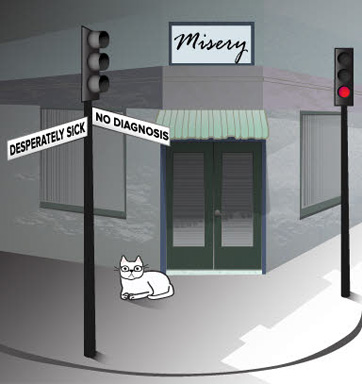On the Corner of No Diagnosis Ave. & Desperately Sick St. the Shops Sell only Misery

Illustration by Tamara Rees of VIN
My wife (also a veterinarian) and I were chatting about our cases over dinner one night:
“Hey, I diagnosed that dog I was telling you about, the lame one from last week, with bone cancer today,” I said.
“That’s awesome!” she replied brightly.
Did I marry some sort of heartless ghoul who revels in pain and suffering?
No – she’s a lovely, kind, empathetic and sparkly princess who fosters kittens, still cries at rom-coms and doesn’t eat anything that’s ever had a mother.
So, what the heck? Why the cheery glee at my diagnosis of one of the most aggressive and certainly fatal types of cancer known to science?
The answer lies in that last sentence: I had a diagnosis.
I knew what was going on. I knew the enemy.
Our brains have been warped by years of TV telling us that medicine is a well-nigh infallible art that eventually must churn out one diagnosis to match every sick patient, human or animal. The actual truth is much scarier and far less satisfying than last week’s episode of House MD or Grey’s Anatomy, where the life-saving diagnosis is made right after the third commercial break and it’s all neatly wrapped up by the credits. That’s some bad hat, Harry.
The universe doesn’t actually give a hoot if I can figure out what’s going wrong inside a pet. It just keeps on spinning. There’s no immutable law that says modern veterinary medicine must have a concrete decryption of the disease process happening in my patient. There are lots of ways to be sick, and not all of them have names.
For my patients at least – dogs and cats – we often don’t arrive at a diagnosis or don’t arrive at one in time or within the budget. Many patients are either treated for just the symptoms (for example, controlling vomiting with an anti-nausea medication, rather than finding out why the patient is vomiting), treated for our best guess of what is going wrong (without confirmation) or not treated at all. Luckily, many patients get better on their own, regardless or in spite of what we treat them with or what we think is going on with them.
One of the worst scenarios that you can find yourself in in modern medicine is when you’re faced with a patient that’s desperately ill with no clue what’s killing it. Unfortunately, it happens all the time. We have to simultaneously run tests to figure out what’s killing them, keep them alive with whatever supportive measures we can dream up (often based on an incomplete data set, fallible history and our best guess and instincts), while trying not to spend all the owner’s money in the meantime and give owners the information needed to make an informed decision.
That’s like trying to write the sequel to War and Peace after taking Nyquil, riding a unicycle over the Grand Canyon and juggling honey badgers. Sort of like that anyway. Last time I did it.
In any case, whatever your preferred analogy, it’s a shadowy netherworld where nothing is certain and the stakes are high. It's best avoided if possible.
Even a diagnosis for something bad, like my cancer example at the beginning, is often far better than not knowing. If you don’t know what’s going on with a patient and you’re just playing Spin the Wheel of Medications and trying this therapy or that for weeks on end, you risk drug interactions, the disease progressing and the poor patient being stuck in the middle.
This is one place in life where bad just might have the edge over unknown. It’s the devil you do know. Obviously, something good and treatable would be preferred – I love giving good news – but the universe has a way of keeping its secrets from us mere mortals. As least with bad, you know what’s going on and what path you need to take.
Look at that: like a politician, I just made a bad thing a good thing! I think I’ll run for office.
1 Comment
Jodie Spencer
October 25, 2015